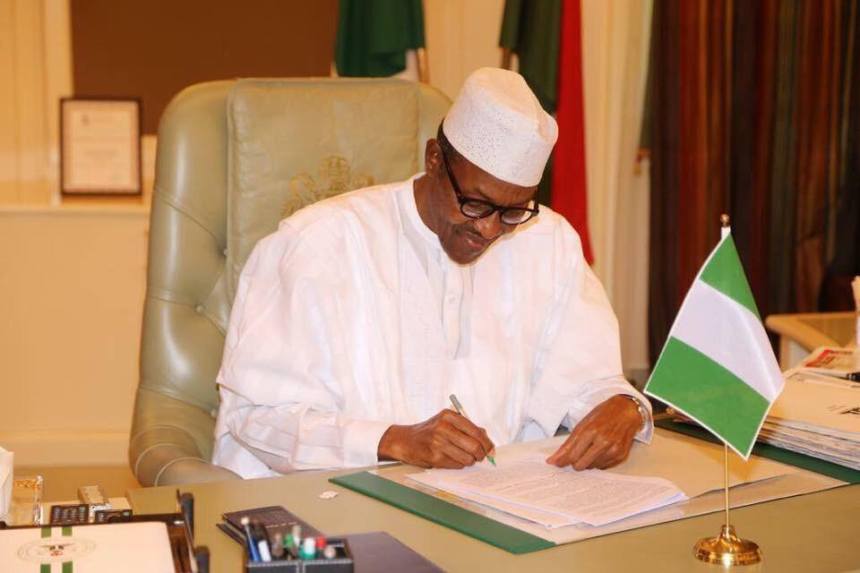- FG Saves N4.7bn Monthly Through TSA, Says Buhari
President Muhammadu Buhari on Tuesday said his administration was saving about N4.7bn monthly through the full implementation of its policy on the Treasury Single Account.
He said over 20,000 bank accounts belonging to the Federal Government had so far been consolidated into one.
Buhari disclosed this while declaring open the 2017 e-Nigeria Conference organised by the National Information Technology Development Agency held at the International Conference Centre, Abuja.
The President said his administration also leveraged on Information Communication Technology to introduce the Integrated Payroll and Personnel Information System and Bank Verification Number.
He said the implementation of the IPPIS had helped to eliminate ‘ghost’ workers on the government’s payroll and was saving it over N20bn monthly.
Buhari stated, “You may recall that on assumption of office, we enforced the policy on Treasury Single Account. Today, we are all witnesses to the impact it has made on our financial management. We have so far consolidated over 20,000 accounts, resulting into about N4.7bn monthly savings.
“In addition, the policy facilitated transparency, accountability and ease of transactions and payments between government and businesses as well as government and citizens.”
He added, “Another initiative leveraging on ICT and making huge impact on the economy is the introduction of the Integrated Payroll and Personnel Information System and Bank Verification Number.
“Its implementation has helped to eliminate the menace of ghost workers thereby reducing waste in the system by saving government over N20bn monthly.”
Buhari said his presence at the opening of the conference was a demonstration of his administration’s commitment and strong belief in using ICT as a major driver of developmental governance and economic reform plans aimed at bringing about the true change he promised Nigerians.
He described ICT as strategic in driving productivity and efficiency in all sectors of the economy.
The sector, he stated, has recorded huge investments and was contributing over 10 per cent of the nation’s Gross Domestic Product.
According to him, the government is making conscious efforts to see that this contribution continues to grow in the next few years.
The President regretted that about 80 per cent of ICT hardware purchases were imported through local distributors of Original Equipment Manufacturers by Ministries, Departments and Agencies and other government establishments.
This, he noted, made it difficult for the country to benefit from the dividends of continuous procurement and consumption of ICT infrastructure and limited value retention within the country.
The President recalled that the present administration recently issued an Executive Order mandating all MDAs to give preference to locally manufactured goods and services in their procurement of IT services.
Such measures, he said, were part of the deliberate efforts at encouraging local manufacture of ICT infrastructure, creating job opportunities, providing investment opportunities as well as strengthening the nation’s currency.
He noted that ICT played a pivotal role with agencies of government such as the Corporate Affairs Commission, Federal Inland Revenue Service and the Nigeria Immigration Service, which had leaned on ICT in improving public service delivery in an efficient and transparent manner.
So far, he said 31 reforms had been completed by the council and these reforms are already making noticeable impact on the government’s economic diversification efforts.
Buhari commended NITDA’s efforts at enforcing the Federal Government’s directive on ensuring that all ICT projects in the country were cleared by it before implementation.
“These efforts will ensure that government’s ICT procurements are transparent, they are aligned with government’s IT shared vision and policy, save costs through promotion of shared services, avoid duplication, ensure compatibility of IT systems thereby improving efficiency across government and enforce the patronage of indigenous companies,” he said.

 Billionaire Watch3 weeks ago
Billionaire Watch3 weeks ago
 Startups4 weeks ago
Startups4 weeks ago
 News4 weeks ago
News4 weeks ago
 News4 weeks ago
News4 weeks ago
 Bitcoin4 weeks ago
Bitcoin4 weeks ago
 Naira4 weeks ago
Naira4 weeks ago
 Forex3 weeks ago
Forex3 weeks ago
 Treasury Bills4 weeks ago
Treasury Bills4 weeks ago

























